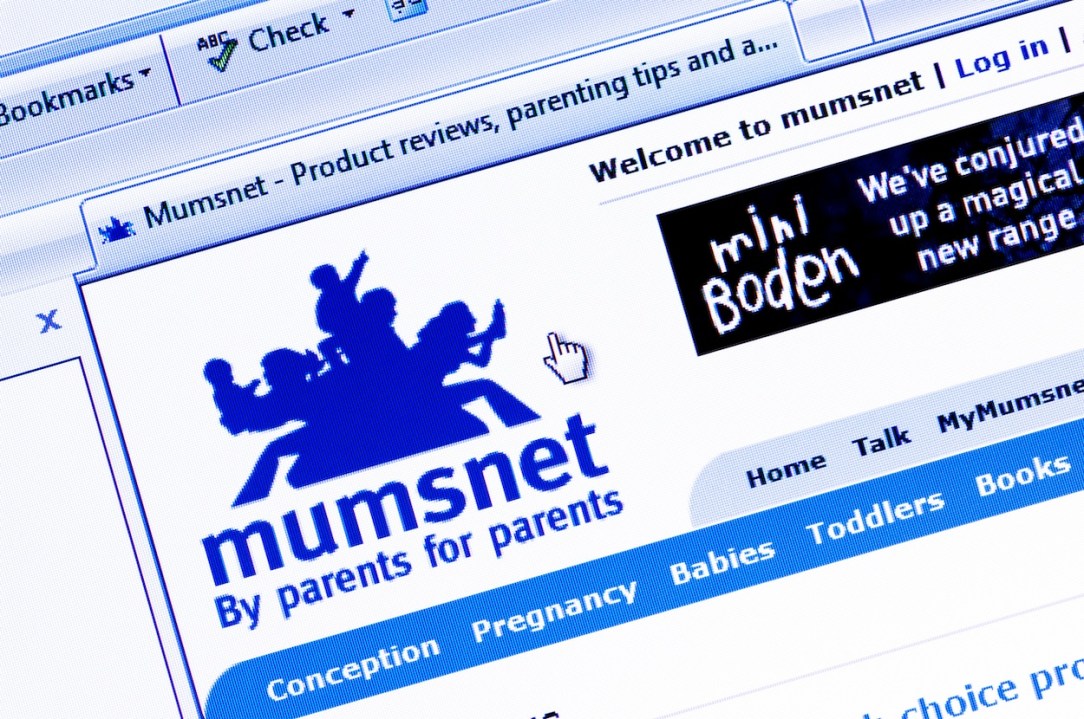I learned recently that Mumsnet is 25 years old, and my immediate reaction was: who the hell is still using Mumsnet? And then I read that Mumsnet has nine million unique users every month, and my immediate reaction was: who the hell are these people?
According to Mumsnet, they’re almost all women, but I don’t seem to know any of them. I’ve never used Mumsnet, and when I conducted some forensically accurate research, I struggled to find any friends who are well acquainted with it. One friend amuses herself occasionally with how middle-class the posts can be, with lots of queries about Eton and sneering at double-barrelled designer baby names. And it can certainly be funny: the infamous ‘penis beaker’ thread is a case in point (though it left me wondering, in my well-adjusted fashion, why and how other women so relish discussing sex with such wince-inducing candour – even buoyed by online anonymity).
Most of the people I asked don’t use it either because they’d rather ask for advice directly from someone they respect and trust, or because they can find the information they’re after on ChatGPT. Anxious first-time mothers no longer have to doomscroll through pages and pages of threads to diagnose infant symptoms at 2 a.m. while battling mastitis and recovering from episiotomy repair. AI can provide an instant response on so many of the problems that seem to confound mothers today, from secondary school choices to marital sexual norms (and kinks), with a degree of clarity that can be obscured by the frankly bewildering array of Mumsnet acronyms. IYSWIM.
So I’d begun to think Mumsnet has become rather irrelevant. But last week saw the unanimous Supreme Court ruling that being a woman is defined by biology, and I realised that Mumsnet is perhaps more relevant than ever before, having become a safe space for women to discuss matters openly and anonymously, and state the bleeding obvious in an age when people face cancellation for doing so. As women’s rights have been chipped away by the relentless march of gender ideology, seemingly unchecked by either scientific accuracy or common sense, Mumsnet has provided recourse for those swimming against the tide.
For it was on Mumsnet that those three doughty Scotswomen – Marion Calder, Susan Smith and Trina Budge – bonded over a nagging sense of the injustice of the implications of the gender ideology movement. In response, they (along with the now deceased Magdalen Berns) formed a campaign group, For Women Scotland, which argued that the Scottish government was wrong in its interpretation of the Equality Act 2010. The group brought a case that only people who are born female are entitled to the protection of sex-based rights. With financial backing to the tune of £70,000 from the fearless J.K. Rowling, For Women Scotland achieved a victory that aligned the law with what should surely be entirely self-evident (but which at the same time didn’t remove the protection to which trans people are entitled – a point which is in danger of being lost in the furore that has followed the ruling). Until this point, acquired gender could be established with a Gender Recognition Certificate for as little as £6.
The implications of this victory for sex-based rights are huge, and come on the back of other legal breakthroughs, such as Maya Forstater’s tribunal victory regarding her ‘gender critical’ stance (I’m looking forward to someone breaking down the etymology of this phrase for me at some point). And personal pin-up Professor Kathleen Stock, who endured years of persecution at the University of Sussex, but was recently rewarded with seeing her alma mater fined just shy of £600,000 for curtailing her freedom of speech (alongside management and governance issues).
I’d begun to think Mumsnet has become rather irrelevant. But last week saw the unanimous Supreme Court ruling that being a woman is defined by biology
Perhaps inevitably, this openness to accommodating debate has been to Mumsnet’s own detriment. As it developed a reputation for being a haven where those with ‘gender critical’ views could speak their minds and voice their concerns (subject to a team of professional moderators and the website’s own guidelines), it has come in for some serious flak: parodied by transgender activists as the ‘prosecco Stormfront’ and boycotted commercially. In response to the Supreme Court ruling, Mumsnet founder Justine Roberts revealed that the pressure brought on the site made her think it wouldn’t survive. It was blacklisted by Barclays, and fellow mothering lifeline Ocado pulled out of a partnership in disgust at the ‘hateful political views’ aired in Mumsnet’s call for clarification of the definition of sex in the Equality Act in its 2024 manifesto.
I hope Roberts, Calder, Smith and Budge are as impervious to the toadying that has ensued as they seemingly were to all the bile they received. Ocado has apologised ‘unreservedly’, and Sir Keir Starmer has welcomed the clarity provided by the judgment, which has allowed him to backtrack on his stance that it’s ‘not right’ to say that only women can have a cervix.
It is perhaps the evident comradeship that keeps Mumsnet going. Many seem to forget how isolating motherhood can be, as all order and sense is sacrificed upon the altar of worship of the bundle of sheer perfection with which you’ve been blessed. The only downside is the tiny bastard’s refusal to sleep or feed or latch on or meet the NHS-approved milestones ahead of time and thereby be in danger of jeopardising his or her chances of getting into Oxbridge. So what better way to celebrate 25 years of women supporting women than a legal victory which affirms that, no, YANBU.








Comments